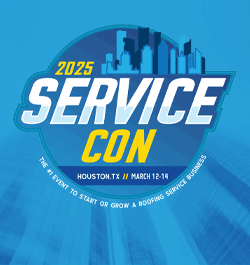Melissa Chapman & Monica Vornbrock - Unlocking Potential With Individual Coaching Services - PODCAST TRANSCRIPT
September 17, 2024 at 8:00 a.m.Editor's note: The following is the transcript of a live interview with Monica Vornbrock and Melissa Chapman of The GLO Group. You can read the interview below or listen to the podcast.
Intro: Welcome to Roofing Road Trips, the podcast that takes you on a thrilling journey across the world of roofing. From fascinating interviews with roofing experts to on-the-road adventures, we'll uncover the stories, innovations and challenges that shape the rooftops over our heads. So fasten your seat belts and join us as we embark on this exciting Roofing Road Trip.
Karen Edwards: Hello, and welcome to another episode of Roofing Road Trips from RoofersCoffeeShop. I'm your host, Karen Edwards and today we are going to be talking about a really interesting topic I think and that is coaching, individual coaching.
So we have our friends from The GLO Group here to talk all about this interesting topic, Melissa Chapman and Monica Vornbrock. Welcome.
Melissa Chapman: Thank you.
Monica Vornbrock: Thank you.
Karen Edwards: All righty. Melissa, why don't you start and introduce yourself?
Melissa Chapman: Sure. My name is Melissa, and I'm one of the founders of The GLO Group and I am a certified professional coach with the International Coaching Federation and been in the roofing industry for, oh gosh, a very long time. Let's just say since the beginning of the 2000s, how's that? And yeah, I just, I love being part of the business or being part of this industry, but I'm really excited to be here, so thank you for having us.
Karen Edwards: Yeah, I'm excited that you're here too. Monica.
Monica Vornbrock: Sure. So my name is Monica Vornbrock, and I am the other co-founder of The GLO Group. I am also a facilitator and coach for individual coaching as well as our group and team workshops, and I have been in the roofing industry for about 15 years as well. I mean, I think I've known you for so many years, just like I don't even know how many years at this point. No need to count.
Karen Edwards: I know. Fun fact for everybody is Melissa and Monica and I have all worked together over those 20-some years in various roles and for various companies. So yeah, we go way back.
Melissa Chapman: We do.
Karen Edwards: It's really exciting to see you guys in this new adventure, but it's not that new. I mean, you've been doing this how many years now?
Melissa Chapman: We're in our fourth year.
Karen Edwards: Yeah. Wow. Time flies. All right. So for those listening, can you tell us what is coaching and how does it differ from consulting?
Melissa Chapman: Well, coaching, as defined by the International Coaching Federation, it defines coaching as partnering with clients in a thought-provoking and creative process that inspires them to maximize their personal and professional potential.
So basically, the role of a coach is really to serve as a partner to help the coachee kind of accomplish any goals that they have set. And it's in a way that as a coach, we don't really lead the client as to where they're going, they lead and we help them kind of uncover some things that will help them reach the goals that they have created for themselves.
The difference with consulting is consulting is they're telling you what to do or they're giving you recommendations. And the whole point of coaching is really serving as a partner and really helping you discover what works for you.
Karen Edwards: So who would benefit from coaching?
Monica Vornbrock: Well, I mean, everyone could benefit from coaching. That's one. But I mean, in the way in which we use our coaching, a lot of it has to do with your professional goals, careers, career desires, where you want to go. We provide guidance, support tools and the resources to help professionals move to the next level, amplify the impact that they have in their company, become stronger leaders and manage a stronger team altogether.
Karen Edwards: So you're acting really as almost a mentor, in a way and the support to help someone achieve their goals is what I'm hearing?
Melissa Chapman: Yes, it's very similar. Obviously, mentorship usually is someone that kind of takes you under their wing, whereas coaching, it does have that mentoring component, but it's really all about diving deeper into the root of maybe some of the challenges so that you can get them out of your way to accomplish what you want to accomplish.
Karen Edwards: Okay. So there's individual coaching, but there's also team coaching, correct? What does that look like?
Monica Vornbrock: So for team coaching, well, there's group coaching, team coaching and individual coaching. So for the team coaching, it's usually a team of people that work together and we bring them in to work on a common goal.
For a group coaching, it could be a common, like a cohort type of coaching setting, but it doesn't have to be that everybody has the same exact goal. With the team workshop, we really aim to help a company or a group of people work towards a common goal for a company, for a department. It's a common goal.
Karen Edwards: Okay. Rather than an individual goal?
Monica Vornbrock: Exactly.
Karen Edwards: So how do I know if I'm running a roofing business and I'm looking at my team and the people on my team, how do I know if they need coaching or want coaching and how do you start that conversation?
Melissa Chapman: Well, some of the symptoms or the things that you would recognize for a team that might need coaching would include a lot of finger-pointing or perhaps you have folks on the team that are not necessarily aligned and working in the same direction and it creates conflict. Or there could be a challenge around conflict resolution, or there could be a slow adoption of new processes or platforms that you're trying to introduce to your company.
So if you see that slow adoption or that lack of engagement, or perhaps your productivity is down or your profitability is down, it's an opportunity to look at, "Okay, what's going on internally that we can address and get everybody back on the same page so that we can improve our performance?"
I mean, from an individual perspective, there have been multiple studies that show that from just individual coaching, leadership coaching, individual coaching, 70% of those that participate in that have an increase in individual performance. That means goal attainment, that means clear communication, that means higher satisfaction. So also results in 50% increase in team performance.
When you have team coaching, that means better conversations, improved collaboration, enhanced work performance. So those, I mean, there's real ROI to investing in these kinds of coaching resources and the return is almost immediate.
Monica Vornbrock: Yeah, and when you have people on your team that you... There are always a couple of people in your team that you look at and you're like, "Hey, this person can be further developed. They're great at what they do, but they're not ready to be leaders yet. How do we get them there?" And that's a great opportunity for getting individual coaching, because we can help them with skill development, with conflict resolution, being able to manage a team, understanding any kind of work-life balance.
All of that, we can help them develop those skills at their own pace, but with the goal of the company, which is to improve this person's abilities or expand on their abilities so that they can be really good leaders in the future.
Karen Edwards: I'm sure that helps with employee satisfaction and retention if you're showing that you care about them and want them to grow?
Melissa Chapman: Yeah, I mean, that's a really good point. There was one study done by Metrics Global that they followed a Fortune 500 company and a coaching services company to really identify the business benefits of including coaching specifically.
And so after the research was concluded, the bottom line was that the coaching produced a 529% ROI immediately and then after factoring in other significant benefits that include financial gains and employee retention, the overall ROI boosted to 788%.
So you talk about employee retention, I mean, there's obviously a hard cost to onboarding employees, losing employees. I mean, it's a huge expense. So when you incorporate coaching into your culture, if you will, like we said, there's a huge return. Most people seek out coaching, top reasons could be just self-confidence, but work-life balance, career opportunities, improving business management and relationships. So like you said, who's coaching for? It's really for anybody.
Karen Edwards: So what does the coaching process look like? How does it work?
Monica Vornbrock: So one of the things that The GLO Group is really big on is assessing and identifying, setting up goals, right? So it starts with a conversation, then it goes into an assessment, like a questionnaire. So we understand where people are coming from, their goals, what's the baseline, where are they starting and what do they want to achieve? Then we set up agreements.
Obviously there's confidentiality in coaching, there's thresholds that we want to meet, like what's the goal? Where do we want to be? And we do checkups at every session to make sure that there's progress that's being made. And if there's something that deters that progress, we work on that, like what's happening? Where are we stuck? Why are we stuck?
But we do a lot of measuring to make sure that things are working at every stage, and even after we complete the sessions and we do surveys after and questionnaires after to make sure that the progress has been maintained.
Melissa Chapman: Mm-hmm.
Karen Edwards: Okay. And what's the-
Melissa Chapman: Yeah. We kind of serve as an accountability partner.
Monica Vornbrock: Mm-hmm.
Karen Edwards: Accountability partner, I love that. There's a craze going on around social media right now of health coaching and people getting fit and losing weight, and I think the accountability is why so many people find success and that's the same here. What's the frequency? What's the check-in look like? How often is that?
Melissa Chapman: Well, for individual coaching, really it depends on what kind of commitment this person has, because it is a commitment. So you meet, it's not just showing up to the actual coaching session, there's typically some work in between that person has identified, "Yeah, I need to work on this." And then like we said, accountability, you come back.
Usually coaching sessions can be every other week. And then if the client feels that they've met their goal or they're ready to kind of go on without having a coaching partner, we'll check in every few months, "Hey, how's it going? Are you maintaining? Who's holding you accountable now? Are you slipping back into older patterns or do you find that you're still having the support to continue down the path that you wish to go down?" So it really varies on the individual, but typically it's every few months we kind of do a little check-in.
Karen Edwards: Okay. I'm curious, what makes The GLO Group different?
Monica Vornbrock: Well, one of the things is there's so many people calling themselves coaches right now, right? As you see, you see online, you see everywhere, everyone's a coach, right?
Karen Edwards: Yep.
Monica Vornbrock: We're professionally-trained coaches. We have gone through the training, we are certified. We're not consultants disguised as coaches, which happens a lot. Unless you want the consulting services, that's a whole other thing, but I mean, we are real and real coaches.
We're also women-owned certified, and we have been in the roofing industry for many, many years, which even though coaching is about that person, knowing that you have somebody who understands what you're going through, understands the language, that I feel like that sets us apart. And Melissa, feel free to add.
Melissa Chapman: Yeah, totally. And we're bilingual. So in the roofing industry specifically, that's very prevalent. So to have the benefit of having an English-speaking and a Spanish-speaking coach on staff, it identifies what's really going on in our industry.
So we also, because we understand the industry, we understand the differences between the field and the office, we understand the differences of the field hierarchies that happen. So because of that knowledge and experience, our perspectives are one that we can relate to our clients in the roofing industry specifically because we understand their challenges firsthand. We've been intimately involved in the industry.
Karen Edwards: Yeah. And that's important. One of our topics on our website for this month is the importance of bilingual training and safety talks and all that stuff. And so I think that's a very, very good point that you make.
Melissa Chapman: Mm-hmm.
Karen Edwards: I'm curious why you wanted to become coaches?
Melissa Chapman: Well, that actually, it happened very organically. Our background is in marketing, and we still provide marketing services as part of our arsenal. But what we kept recognizing. A pattern, in that oftentimes or most of the time, organizations, they would want to, let's say, initiate a marketing campaign and they would invest significant money, resources, time into this effort.
And once it came to fruition, the internal workings of the organization were dysfunctional to a point that they could not really experience the true benefits of these opportunities that were coming their way, because they weren't aligned, people had differing agendas, different departments had differing agendas or they didn't even know this was going on. There was just so much internal miscommunication, lack of communication and lack of alignment. And we kept seeing this over and over again. We're like, "We can fix this."
And to be honest, we've all worked for companies that operated the same way. And it was almost like sales prevention, because it was like no one was working together and so, so many missed opportunities, so much money left on the table. And so we kept seeing this pattern, and so we were like, "We can do something about this." And we saw a need.
So then we pursued our education, and it just so happened that the timing was right because then COVID happened and a lot of organizations were struggling with, "Okay, now how do we deal with this? Because we've got some people remote, some people in office. How do we keep people connected and communicating and aligned when they're not in the same building?" So it was a combination of we saw a need and we created a solution, so.
Karen Edwards: I love it, because it'd be so easy, I'm sure, as I'm a marketer, that's my background too and it's easy to go, "Oh, well, that campaign just didn't work, right? You did a bad job." But that's not the case. The case was the internal communication problem, and you guys recognized that and decided to do something about it. That's really cool.
Melissa Chapman: Yeah. And I mean, and it's not like it happens occasionally. It happens more frequently than you would think. And it's not just related to marketing, it's related to product development, it's related to just productivity in general, being able to meet deadlines or to meet budget demands. So it's universal.
Monica Vornbrock: Yeah, even adopting platforms. CRMs are a big one. You have so many people that are like, "I'm working out of an Excel sheet, I'm working out of the CRM." It's like, "Are you guys talking?" So I mean, the things like that where you see redundancies and you see gaps that can be closed, we see a lot of that. Mm-hmm.
Karen Edwards: Wow, so that is really cool. I love that solutions are developed because there was a problem or there was a need. And in this case, it's not necessarily a widget or a product, but it's a service that really can help people overcome those issues and make more money, advance their career.
Melissa Chapman: Yeah. Yeah.
Karen Edwards: That's awesome.
Melissa Chapman: And it's funny, because coaching really does elevate your game in terms of you're focusing an hour, an hour and a half, whatever, every other week on what's going on with me professionally? How do I make this better? How do I feel better about what I'm doing? Or how do I address challenges that I'm facing or how do I meet the goals?
It can be overwhelming or it could feel very lonely if you have these things going on and you need some guidance, some help. And we provide that support in that there's always a solution. Let's figure it out. And it's remarkable what happens. The self-confidence that people gain from coaching is incredible.
Karen Edwards: Nice. So I'm sold, right? I'm listening to this. I'm like, "I see these things happening in my organization, and I think that you guys can help." How do they get started?
Monica Vornbrock: So you can reach out to us through email, letschat@glogroup.com. You can also email Melissa or myself. It's melissa@glogroup.com or monica@glogroup.com.
And at the bottom of the comment, we'll have a link. So you can start with a consultation, and I believe it's a 15 to 30-minute consultation and we can discuss what your goals are, where you want to go, what you're looking to improve or what you're looking to talk about. I mean, a lot of times it's you owe yourself the time to take that time for yourself. And a lot of people don't do that unless it's scheduled, so that alone in itself, it's a huge, huge, huge, huge improvement in people's lives.
Melissa Chapman: And it's funny, because many people say, "Well, I don't have time." The biggest issue that coaching really helps with is time management. Because it's really easy, "Oh, I can't. I don't have time." Well, actually, you do have time. It's just a matter of looking at things through a different lens.
Karen Edwards: Yeah. Yeah. And if you're listening to this while you're driving, don't worry if you weren't able to write down those email addresses. Go to RoofersCoffeeShop, and The GLO Group has a full directory on there with their contact information and information about everything that they do. So hopefully you'll take advantage of that.
Melissa, Monica, thank you so much for being here today. This was a great conversation.
Melissa Chapman: Oh, thank you so much.
Monica Vornbrock: [inaudible 00:22:20].
Melissa Chapman: We appreciate it.
Karen Edwards: Yeah. And thank you all for listening to this episode of Roofing Road Trips. Be sure to follow us on social media so that you don't miss a thing, and we hope to see you on a future episode. Thanks, everybody.
Outro: If you've enjoyed the ride, don't forget to hit that subscribe button and join us on every roofing adventure. Make sure to visit rooferscoffeeshop.com to learn more. Thanks for tuning in, and we'll catch you on the next Roofing Road Trip.
Recommended For You

Shattering Silos: Transforming Roofing - PODCAST TRANSCRIPT
Read More ...
Melissa Dunson – Who is Central States Manufacturing? - PODCAST TRANSCRIPT
Read More ...
Cody Barnes - What's the story data can share? - PODCAST TRANSCRIPT
Read More ...







-2.png)








Comments
Leave a Reply
Have an account? Login to leave a comment!
Sign In